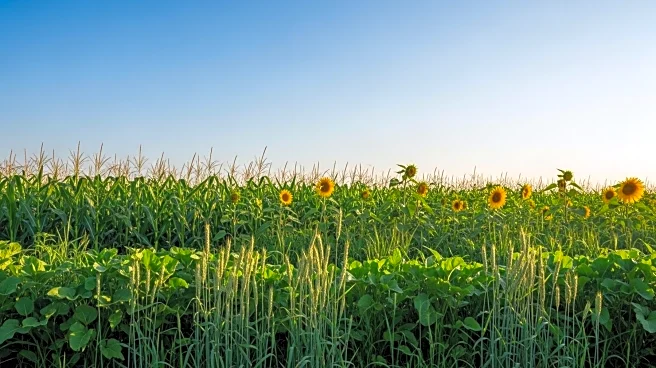What's Happening?
The Sustainable Agriculture Market is experiencing significant growth as global demand for eco-friendly and climate-resilient farming practices increases. The market, which includes techniques such as organic farming, agroforestry, and conservation tillage, is projected to expand from $22.9 billion in 2024 to $69.5 billion by 2034, with a compound annual growth rate (CAGR) of 11.7%. This growth is fueled by consumer preferences for organic, locally sourced, and chemical-free produce, alongside government support through subsidies and favorable policies. Key players in the market, such as Indigo Ag, AeroFarms, and Yield10 Bioscience, are investing in precision farming technologies and bio-based inputs to enhance sustainability outcomes.
Why It's Important?
The expansion of the Sustainable Agriculture Market is crucial for addressing environmental concerns and promoting food security. As consumer awareness regarding food safety and environmental sustainability grows, the demand for sustainable farming practices is expected to rise. This shift not only supports healthier ecosystems but also aligns with global efforts to combat climate change. The adoption of technologies like IoT, AI, and drones in precision agriculture enhances resource efficiency and crop yields, offering significant benefits to farmers and agri-businesses. Moreover, the market's growth presents opportunities for innovation and investment in emerging segments such as vertical farming and sustainable aquaculture.
What's Next?
The Sustainable Agriculture Market is poised for further expansion as technological advancements continue to drive efficiency and sustainability. Companies are likely to pursue strategic partnerships, mergers, and acquisitions to strengthen their market presence. Additionally, government initiatives and policies aimed at promoting eco-friendly farming practices are expected to accelerate adoption. As geopolitical tensions and climate variability pose challenges, stakeholders will need to engage in strategic planning to mitigate risks and capitalize on growth opportunities. The integration of digital solutions, such as blockchain and AI-enabled analytics, will play a pivotal role in optimizing resource use and enhancing supply chain transparency.
Beyond the Headlines
The growth of the Sustainable Agriculture Market has broader implications for global food systems and environmental health. By reducing reliance on chemical-intensive agriculture, sustainable practices contribute to improved soil health and biodiversity. This transition also supports social equity by promoting fair labor practices and community engagement. As the market evolves, ethical considerations regarding land use, resource allocation, and technology deployment will become increasingly important. Long-term shifts towards regenerative agriculture and soil health-focused practices could redefine agricultural norms and contribute to a more resilient and sustainable global food system.










